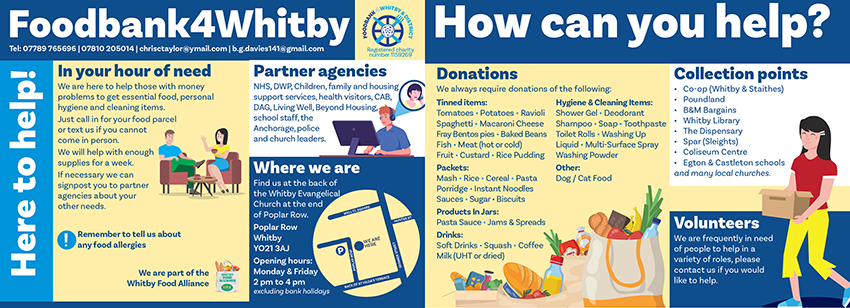Whitby Foodbank provides emergency support to people in crisis
Monday 18th March

Foodbanks in the United Kingdom play a crucial role in providing essential support to individuals and families facing food insecurity. The rise of foodbanks in the UK over the past decade reflects deeper societal issues such as poverty, inequality, and the ever increasing cost of living. While they serve as a vital lifeline for many, they also highlight the systemic challenges that exist within the country.
Established to address immediate food needs, foodbanks distribute donated food to those in crisis. The Trussell Trust, the largest network of foodbanks in the UK, operates over 1,200 foodbank centres nationwide. These centres rely on donations from individuals, businesses, and organisations to stock their shelves and provide assistance to those in need. Volunteers play a crucial role in managing day-to-day operations, from collecting donations to distributing food parcels and offering support to clients.
Despite the valuable service they provide, foodbanks are not a sustainable solution to food insecurity. They often operate on the goodwill and generosity of the community, highlighting gaps in the social safety net. Many clients are referred to foodbanks by frontline services such as social workers, healthcare professionals, and schools, indicating the growing reliance on emergency food aid to meet basic needs.

The increase in foodbank usage in the UK has been met with mixed reactions. While some view foodbanks as a temporary measure to address immediate hunger, others see them as a symptom of deeper social issues such as poverty and austerity. Critics argue that foodbanks perpetuate a cycle of dependency and mask the underlying causes of food insecurity, including low wages, benefit delays, and inadequate social support.
The COVID-19 pandemic further exacerbated food insecurity in the UK, and led to a surge in demand for foodbank services. Lockdowns, job losses, and economic uncertainty pushed more individuals and families into financial hardship, increasing the strain on already stretched foodbank resources. Foodbanks have had to adapt their operations to meet the growing need while continuing to ensure the safety of volunteers and clients.
Efforts to address food insecurity in the UK require a multi-faceted approach that goes beyond the provision of emergency food aid. Policymakers, advocacy groups, and communities must work together to tackle the root causes of poverty and inequality, ensuring that all individuals have access to nutritious and affordable food. This includes initiatives to increase household income, improve access to affordable housing, and strengthen social welfare programs.
In conclusion, foodbanks play a vital role in supporting individuals and families in times of crisis, but they are not a long-term solution to food insecurity. Addressing the underlying causes of poverty and inequality is essential to creating a more equitable society where everyone has access to an adequate and nutritious diet.

Let the Whitby Advertiser spread the word!
The Whitby Advertiser welcomes local community groups and charities to share the buzz about your upcoming events on our website! Whether it’s a fundraiser, festival, or community gathering, let us help you spread the excitement.
Seize the spotlight and make your event a community sensation! Connect with us at info@whitbyadvertiser.co.uk or telephone 01947 605500



